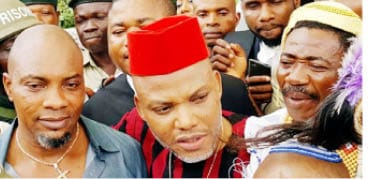News
Nnamdi Kanu’s Path To Life Imprisonment

On the evening of October 14, 2015, Nnamdi Kanu received “unwanted guests” at his hotel room in Lagos State. Kanu, who was then based in the United Kingdom, had built fame especially among South Easterners, as a result of his incendiary broadcast on Radio Biafra, which was formed in a London apartment. He had sneaked into Nigeria unknown that the government had stepped up its game to quell his gospel of hate, which was targeted at the government of late President Muhammadu Buhari. Operatives of the Department of State Services (DSS) had swooped on his hotel in Ikeja, Lagos, where they picked him up and subsequently charged him with treasonable felony.
If the arrest was meant to put him in check, it did to an extent, as he was restrained from circulating his negative rhetoric, but on the other hand, it brought him to public consciousness from relative obscurity.
Like Kanu, like Uwazuruike
Before Kanu, was Ralph Uwazuruike, leader of the Movement for the Actualisation of the Sovereign State of Biafra (MASSOB). A common trait between Uwazuruike and Kanu is the secessionist agenda. The government of ex-President Olusegun Obasanjo clamped down on the MASSOB founder over his extremist views. At that time, little or nothing was known about Kanu, who was one of the Apostles of Uwazuruike. But probably in his quest for fame, Kanu pulled out of MASSOB and floated IPOB, which weaponsied violence and propaganda.
Violence & propaganda
Under his watch, IPOB grew so violent that it formed an armed wing known as Eastern Security Network (ESN), which reportedly forged alliance with Niger Delta militants and carried out deadly attacks in the South East, with security operatives as main targets. Under the banner of ‘Unknown gunmen’, the group reportedly orchestrated a series of jailbreaks, attacked police formations and hit military checkpoints across the region, resulting in deaths and tales of regrets.
Talking about propaganda, the effect of the propaganda could be better imagined when a Lagos-based medical doctor married to a nurse asked if it was true that the Buhari at Aso Rock was not Jubril from Sudan, as Kanu had propagated via Radio Biafra. The rumor spread like wildfire and sadly, many saw it as the gospel truth.
After 18 months in detention, Justice Binta Nyako of a Federal High Court in Abuja, granted Kanu bail.
The bail came with some caveats; that Kanu must not grant media interviews and avoid being seen in a crowd of more than 10 people. The terms were, however, flouted at will.
“I don’t care,” he had retorted, during an interview when asked if speaking to the media could get him into trouble. “It’s like asking me not to breathe. I can’t go outside to call for a press conference. I can’t go on Biafra Radio to broadcast. I can’t allow large groups of people to basically congregate outside to see me.”
His disregard for the court order was the stick with which Labaran Magaji, the Federal Government’s counsel, used to demand that the bail be revoked. But the IPOB leader had retorted that “any person who comes to arrest Nnamdi Kanu in Biafra land will die here”.
To check the breakdown of orderliness, the Nigerian Army launched “Operation Python Dance”, which sought to curb the “violent agitations by secessionist groups amongst other crimes in the South-East region.
Smuggled out of reach
In September 2017, the Army’s ‘python’ danced to the doorsteps of the IPOB leader’s family home in Afarakwu, Abia State. Witnesses claimed the soldiers surrounded the house after arriving in the town in armoured vehicles and Hilux vans.
After the invasion of their home by the military, Kanu and his parents were not seen in public for two weeks, which birthed the reports that the IPOB leader may have been killed by soldiers. The news gained a bit of credence when Emmanuel, Kanu’s younger brother, said he strongly believed his brother fell into the hands of troops.
The Nigerian Army, however, maintained that it had neither arrested nor killed him. In one of his first public appearances after the saga, Kanu narrated how he escaped.
“When I came out (of prison), I continued to preach to my people. I continued to practise my Jewish religion. And one day, the Nigerian Army came to my house to kill me. They killed 28 people in their attempt to kill me. My people evacuated me before they came to my bedroom. They took me away and smuggled me out of Nigeria. I needed some time to recover which I did and then, had to make my way to Israel,” he had claimed.
In October 2017, when the court sat to resume the treason trial dangling around the neck of the IPOB leader, he was nowhere to be found. Enyinnaya Abaribe, a Senator from Kanu’s home state of Abia and one of the sureties that stood for him, was asked to produce the accused or forfeit his N100 million bail bond.
Speaking on the incident later, Kanu said he skipped bail because of the stringent conditions, which “caged” him along with the secessionist group.
Extradited to Nigeria
On June 29, 2021, Kanu was seen in handcuffs paraded by Nigerian security operatives. It was later learnt that he was apprehended in Kenya where he had gone for a programme. Explaining how the IPOB leader was arrested, Abubakar Malami, then Attorney-General of the federation, had said Kanu was arrested on June 27, 2021, through joint efforts of the intelligence and security services. Malami said he was promptly returned to the country to resume his unfinished trial.
The DSS obtained a court order to hold Kanu in its facility. The IPOB leader launched a legal battle to secure his release or leave the agency’s custody. On April 8, 2022, a Federal High Court in Abuja, struck out eight of the 15-count charge against him, finding they lacked substance. But the DSS challenged this ruling at the Court of Appeal which quashed the remaining seven charges and ordered his immediate release from detention. Still not satisfied, the secret police went to the apex court, which on December 15, 2023 overturned the appellate court’s decision and restored the remaining seven-count terrorism charge.
In March 2025, a new judge, Justice James Omotosho, took over the trial and ordered accelerated hearing of the case. The Federal Government closed its case in May 2025 and the case was adjourned till October when Kanu was to open defence. Rather than open defence, the IPOB leader fired his defence team on October 23, 2025, and started representing himself. The trial was adjourned to October 27, 2025 because Kanu said he could not proceed with his defence because his former legal team had not handed over his case file.
On October 27, 2025, Kanu told the court that he had reviewed the prosecution’s case and found no valid charge against him. He asked the judge, whom he accused of having no knowledge of the law, to set him free.
The judge gave Kanu multiple opportunities to open defence but he refused, hence he was deemed to have waived his right to do so and Justice Omotosho fixed November 20, 2025 for judgement. Before he left the court, he poured invectives on the judge and even challenged a DSS official.
The verdict
On the judgement day, Kanu continued his style of talking down on the judge, but Justice Omotosho ordered him out of the court and subsequently found him guilty of all seven counts of terrorism filed against him.
After the conviction, Adegboyega Awomolo, lead Counsel for the Federal Government, asked the court to impose death sentence on Kanu.
But in his judgement, Omotosho sentenced Kanu to life imprisonment. He said he did not sentence him to death based on the fact that capital punishment was going into extinction worldwide and also because the Holy books recommend mercy.
“Life is sacred to God,” he held.
(Daily trust)






